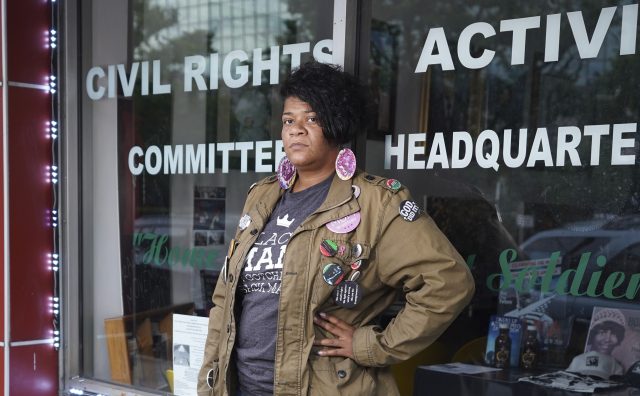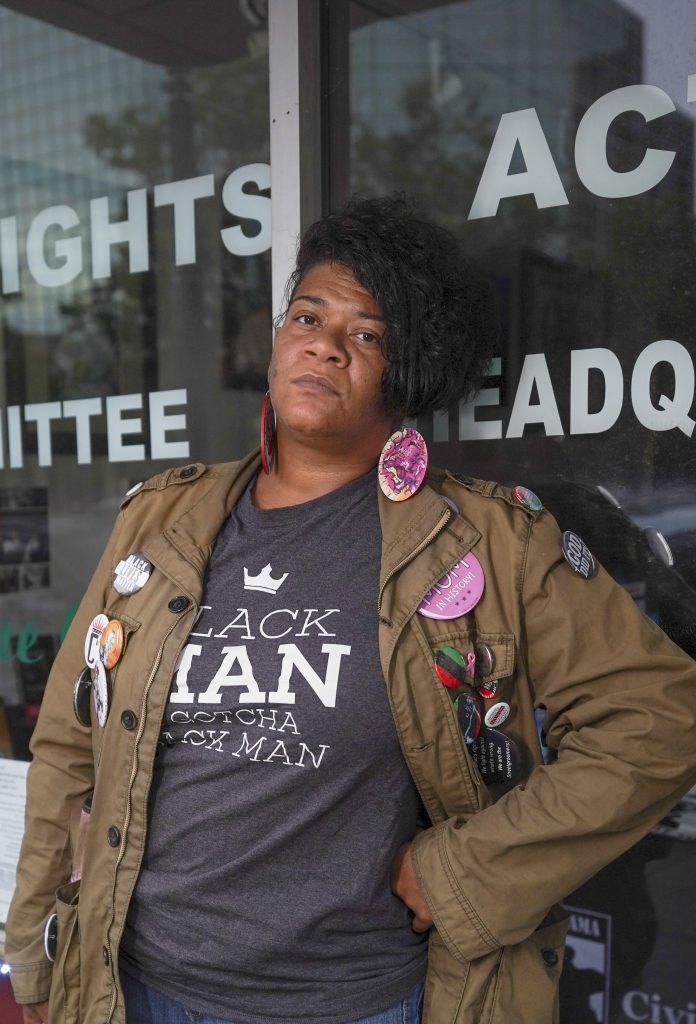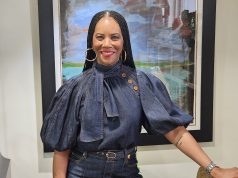
By Je’Don Holloway Talley
For the Birmingham Times
When most in high school wanted to become doctors and lawyers, Sherrette Spicer knew she wanted to chart a different path. Spicer wanted to become an activist.
“I marched, lobbied, organized, and worked to formulate policies because activism is more than just wanting reform—it’s taking measures to actually make it happen, activating people and enabling them to help others,” she said.
Since then, Spicer, 39, known more commonly as “Lady Freedom,” has become a teacher of nonviolence and worked alongside several elected officials, including Democratic members of the U.S. House of Representatives Maxine Waters (California) and Sheila Jackson Lee (Texas), along with a host of organizations and activists in the fight for justice, equality, and reform.
She’s met and, in some cases, worked with the National Voting Rights Museum and Institute and the Ancient Africa Enslavement and Civil War Museum, both in Selma, Alabama, as well as members of the Black Lives Matter Birmingham chapter and the Freedom Riders. She’s also learned from Foot Soldiers and Black Panthers.
Pink Shotgun
When Birmingham recently faced civil unrest in the wake of George Floyd’s murder at the hands of a Minneapolis, Minnesota, police officer, Spicer was among those who helped protect Birmingham’s historic Fourth Avenue Business District. She showed up with a pink shotgun to “protect black history and black businesses,” she said.
“[The media] talks about the destruction but not about the people that were doing the right thing because it’s not as fascinating as the looting, burning, and graffiti,” Spicer said. “We had strategic points that we were protecting. We had one set [of protectors] by the Green Acres [restaurant] and the Carver Theater, [both in the historic business district]. … It was a very long night. I didn’t get any sleep.”
Spicer was also instrumental in the protests for Emantic “EJ” Fitzgerald Bradford Jr., who was shot and killed by a Hoover, Alabama, police officer at the Riverchase Galleria shopping mall in November 2018.
“This is an intergenerational and interracial group of people that are still fighting for justice for EJ,” said Spicer, arrested a number of times for her activism.
Spicer is also a part of the 21st Century Youth Leadership Movement, a nonprofit organization that connects, transforms, and inspires high school students across the state of Georgia.
“I enlisted as a teacher,” she said. “We use arts and music to teach history, [and we] have training workshops several times a year. … The training that we give to them helps me, [too], because no matter how much you think you know, you still can improve.”
Spicer’s work has led her to protests across the country with Tarana Burke, founder of the #MeToo movement, and LaTosha Brown, co-founder of the Black Voters Matter Fund.
Work to Do

Spicer, mother to 13-year-old daughter Radiance, said she balances multiple jobs while fighting for the rights of others. She currently works full-time for a phone company, does legal assistant work for a local Civil Rights firm, and does some comedy and acting. Before the COVID-19 pandemic, she worked at a local retail outfit.
Asked how she balances comedy with activism, Spicer said, “The same things that’ll make you laugh will make you cry. [Legendary comedian] Dick Gregory was one of my favorite teachers.”
Like everything else, COVID-19 has had an affect on grassroots activism.
“I had to shift gears because the grassroots door-to-door [method] has come to a screeching halt,” Spicer said. “I can’t go out and hand out flyers like I once could. As an adaptation, we are seeing more Zoom and digital meetings, as opposed to face-to-face. As a result, we’ve been using our own devices to tell our own stories and record our own histories.”
The quarantine has allowed Spicer to regroup and “better organize,” she said.
“I didn’t have to work all four of my jobs, [so] I took a little time to refocus and organize and revisit some strategies and projects.”
“Science” of Nonviolence
The Titusville resident arrived in Alabama in 1999 from her native Illinois to attend Troy State University to study criminal justice and political science. During that time, she became a member of the Selma Center for Reconciliation and Peace Studies, where she studied the principles and science of nonviolence under the renowned Dr. Bernard Lafayette, a longtime Civil Rights activist and organizer, who was a leader in the Civil Rights Movement.
“He’s the man that [the Rev. Dr. Martin Luther King Jr.] sent to Selma [to begin organizing],” Spicer said. “Without [Dr. Lafayette’s] leadership and teachings, I would be someplace totally different right now. It helped me so much that I went the next step to get certified to teach others the science.”
Spicer eventually went on to work with Malika Sanders-Fortier, who took the Alabama State Senate District 23 seat of her father, Hank Sanders, who served nine terms in office.
“We worked together on [The Ordinary People Society (TOPS)] to reinstate voter rights for felons and the Bridge Crossing Jubilee in Selma every year [in memory of the late U.S. Rep. John Lewis’s heroics on the Edmond Pettus Bridge],” she said.
That is where Spicer worked with U.S Rep. Lee on the Freedom Rides from Selma, which “hit all the Southern [capital cities to Washington, D.C.],” Spicer recalled, “It’s more about how we take what we talk about in workshops and create change. It’s about getting on a bus and going to D.C. and lobbying to pass bills.”
“Here She Comes”
Speaking of Selma, Spicer was part of two talk radio shows in the city—“The Public Conversation” and “The Sista Circle”—and it’s where she got her nickname, “Lady Freedom.”
“One of the radio hosts there would let me come on air and talk about whatever I wanted to vent about that day,” she said. “One day, I was headed to the station, and the host saw me headed up the road and said, ‘Here comes Lady Freedom. Let’s see what she got to report on today,’ and [the name] stuck.”
Spicer’s radio show segments helped lead to the arrest and conviction of a police officer.
“Callers would call in and talk about [their run-ins with him], and they were concerned about their well-being. … I felt like, ‘You only live once. If I die while getting [him off the street], so be it.’ … I had to fight and go to city council several times to get them to act …,” she said, and eventually an arrest and conviction were made.
When Spicer arrived in Birmingham in 2006, she fell in love with the city.
“I was at a place of frustration with my activism in the South because it was like, ‘How are you gonna get rid of all the racism?’ It felt impossible, … but I really appreciate the activist community here. I saw the work they were doing, so I decided to give it another shot—and I’ve been here ever since.”
Being the Change
Spicer, the oldest of two children, was born in Grand Fort, North Dakota. For a while, she lived in Greensboro, North Carolina, where her dad, a U.S. Air Force major, taught at North Carolina Agricultural and Technical State University. She also lived in Oklahoma and in Illinois, where she graduated from high school. Spicer remembers her military household being orderly.
“We had traditional values: respect and love each other, be honest, do your chores, do what mom, [Deborah Spicer], and dad, [Larry Spicer Sr.], said to do—or else,” she said. “I’m the oldest child. My brother, [Larry Jr.], and I had a great upbringing. I enjoyed getting to travel to different places and getting to meet different kinds of people because of my dad being in the service.
“Activism for me started with my family. It was instilled in us that it was our duty to help other people. … Both of my grandfathers are community leaders; they’re pastors. Historically, the church is part of the Civil Rights Movement. My [maternal] grandfather, Lonnie Williams, was one of the first Black truck drivers in [Coffee County, Alabama], and he and some of the community members got together to try and protect their area from [Ku Klux Klan (KKK)] burnings. They were organizing together to help protect their families and communities.”
Spicer has had her own experiences with the KKK. While on an eighth-grade class trip while living in Chicago, she and her classmates encountered a Klan rally while on a tour of historic sites.
“We were headed to the shopping part of our trip, and the Klansmen were actually blocking traffic, so the bus had to re-route,” she said. “It was really weird to see Klansmen in real Klan outfits in a metropolis setting. … Until that point, in my mind, the KKK was always something that was rural and southern. … It just was not where I ever expected to see that.”
As for the future, Spicer said she wants to secure freedom and justice “for seven generations [to come]—not just for my daughter, but for her children’s children and beyond.”
“I don’t want to be a keyboard revolutionary,” she said. “Activism fulfills me in that aspect by knowing I did what I could to be the change I want to see in the world.”



